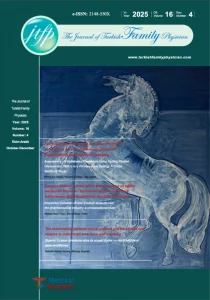Training Family Health Center Building Experience of Marmara University Medical School Department of Family Medicine
According to the determination of the Specialty Board in Medicine, Famiy Medicine residency students are expected to spend half of their specialty training program in the family practice. During this time period residents must gain competencies in primary care management, patient centered approach, specific problem solving, comprehensive approach, community oriented and holistic approach. To reach these goals, according to the Training Family Health Centers’ (TFHC) 2015 regulations, Marmara University the Department of Family Medicine has begun its field experience and trainings on July the 1rst 2016. In this article this experience is going to be shared.
There were a total of three Centers: Tuzla, Pendik and Maltepe Başıbüyük TFHCs. Three Family Health Units existed in Tuzla, three in Pendik and two units in Maltepe Başıbüyük Centers. TFHCs started without any registered population, at the end of eight months are providing health care to all the age groups both preventive care and treatment services.
During this time period, the Center worked with only one family health personel/nurse instead of three for a Center of three units and there were some limping, in the continuity of the appointments of the nurses. Maltepe Center which was in the University Başıbüyük campus had problems to register patients since it was inside the campus borders far away from the main road of the Başıbüyük district. In Pendik and Tuzla TFHCs registered patient number was nearly 1800 per unit at the end of eight months. Unmet need of the nurse and other office personel, deposit of the money for “current expenditure” to the Training Hospital instead of the doctor and/or the trainer, and buroctratic problems in their spending, caused delay in the buying process of some lacking equipment and to solve the problems.
However due to all these problems the opening of these training health centers is a very important beginning for the Family Medicine Specialty Training. In the primary care to raise more qualified and competent doctors, there is need for a new TFMC model with a well designed infrastructure, education and training oriented, well equiped, supported by competent personel, managerially linked to the Institution responsible of the education, that give opportunity to the trainer to practice as a role model, that bring in the foreground educational outcomes more than the patient number/count. To increase the number of such TFHCs; the maintenance of all the stakeholders adopting a facilitator role by especially providing and supporting personel and a new and education centered regulation relying on the experiences would be beneficial for the future of Family Medicine.
References
- Ünlüoğlu İ, Çağlayaner H. Aile Hekimliğinde Oluşan Akademik Gelenek ve Gelecek. Aile Hekimliği Dergisi 1997;1(1):46-9.
- Türkiye Aile Hekimleri Uzmanlık Derneği (TAHUD) Tarafından T.C. Sağlık Bakanlığı Türkiye Halk Sağlığı Kurumu Başkanlığı’na (THSK) verilmek üzere hazırlanan kısa rapor. 06.03.2017 tarihinde http://www.tahud.org.tr/view/contentFiles/upload/files/THSK%20Rapor%20Toplam.pdf adresinden erişilmiştir.
- Marmara Üniversitesi Tıp Fakültesi, Aile Hekimliği Anabilim Dalı. Marmara Üniversitesi Tıp Fakültesi Aile Hekimliği Uzmanlık Eğitim Programı-UZMEP, 2015.
- Türkiye Aile Hekimliği Yeterlilik Kurulu, 2013. Aile Hekimliği Uzmanlık Eğitimi Çerçeve Programı. 27.02.2017 tarihinde http://www.tahud.org.tr/view/contentFiles/dokuman/20160614092754.pdf adresinden erişilmiştir.
- Wonca Europe 2011. The European Definition of General Practice/Family Medicine. 2011 edition. 03.03.3017 tarihinde http://www.woncaeurope.org/sites/default/files/documents/Definition%203rd% 20ed%202011%20with%20revised%20wonca%20tree.pdf adresinden erişilmiştir.



